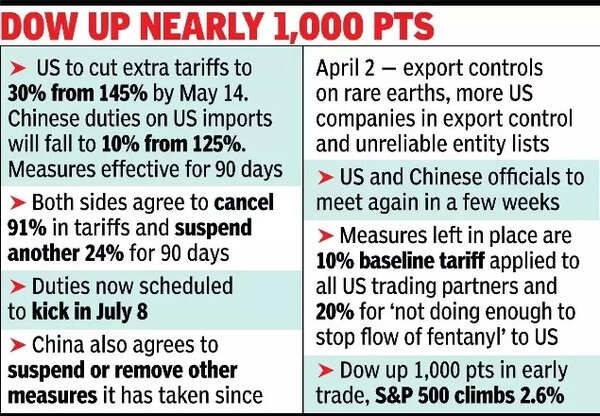NEW DELHI: The US-China trade deal has increased the headache for Indian negotiators, who are once again headed to Washington DC to discuss the proposed bilateral trade deal.
While signalling movement towards a deal between the world's two largest trading nations, the 90-day truce, which will see them slash tariffs by 115 percentage points, opens the door for the flow of goods from China.As a result, some of the interest in Indian products is bound to come down as supply lines will reopen for 90 days, apart from some front-loading of consignments in case the pause is not extended.
Explaining that many of the tariffs that he imposed remain in place, Trump said talks would be focused in part on “opening up” China to American businesses. He said he expected to talk to President Xi Jinping later this week, but putting a full deal on paper would take a while.
The outcome of the frenzied weekend of negotiations in Switzerland brought tariff rates close to where they were before Trump ratcheted them higher on April 2, which he billed as “Liberation Day”. However, the talks did not appear to yield any meaningful concessions beyond an agreement to continue discussions.
“We concluded that we have a shared interest,” said treasury secretary Scott Bessent at a news conference in Geneva where US and Chinese officials met over the weekend.
“The consensus from both delegations is that neither side wanted a decoupling,” he said.
China said it will suspend or revoke countermeasures adopted in retaliation for escalating tariffs. In early April, the Chinese govt had ordered restrictions on the export of rare earth metals and magnets, critical components used by many industries.
The agreement breaks an impasse that had brought much trade between China and US to a halt. Many American businesses had suspended orders, holding out hope the two countries could strike a deal to lower the tariff rates. Economists have warned the disautomakers, aerospace manufacturers and semiconductor firms.
Bessent said the two countries may also discuss purchase agreements of American goods by Chinese govt. pute will slow global growth, fuel inflation and create product shortages, potentially tipping US into a recession. “We came with a list of problems we were trying to solve, and I think we did a good job on that,” Bessent said.
Global markets jumped on the announcement. The two countries said the ongoing negotiations will involve Bessent; Jamieson Greer, the US trade representative; and He Lifeng, China’s vice-premier for economic policy, who led the talks for the Chinese.
Global markets jumped on the announcement. Bessent said the Chinese “understood the magnitude” of the fentanyl crisis in US and that there is a “positive path forward”.Greer said the talks were underscored by “mutual understanding and mutual respect”, but noted China was the only country to retaliate after Trump imposed reciprocal tariffs on dozens of countries last month.











